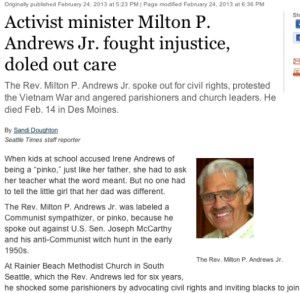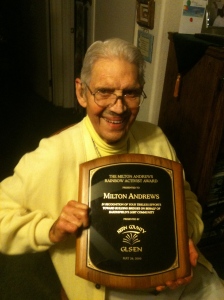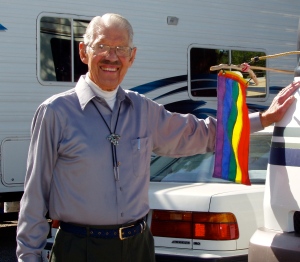REGARDING MEMORIAL SERVICES
Hillside Church, Tacoma
A celebration of Milton Andrews’ life by his four children and other family and friends will be held at 11 a.m. Saturday, July 13 at Hillside Community Church, 2508 S. 39th St., Tacoma. The public is invited.
San Luis Obispo
A service will be held at 3:30 p.m. Saturday, March 23 in United Church of Christ (Congregational) of San Luis Obispo, 11245 Los Osos Valley Rd.
Wesley Homes, Des Moines WA
A service will be held in the Wesley Homes Terrace auditorium at 2:30 p.m. on Monday, March 11, at Wesley Homes, 816 S. 216th St., Des Moines.
Seattle
Services and celebrations to honor my Dad will be held in early summer, date and time to be announced.
UPDATE: The Seattle Times has published a wonderful tribute to my father.

Controversial but loved and respected.
The Rev. Milton P. Andrews Jr., an activist Methodist minister for several Puget Sound parishes, died February 14 at Wesley Homes retirement community in Des Moines WA. He was 90.
Born in Oklahoma City the eldest of eight siblings, Rev. Andrews followed his father into the Methodist ministry after serving as a US Navy officer in World War II and graduating from Oberlin College in 1945. While serving a parish in Newburgh NY, he pursued a masters of divinity at Union Theological Seminary in New York City before being assigned to Rainier Beach Methodist Church in south Seattle.
Rev. Andrews guided the Rainier Beach parish from 1955 to 1961, becoming known for supporting Dr. Martin Luther King and the civil rights movement while opposing McCarthyism and nuclear proliferation.
“Just inviting black people to worship (at Rainier Beach) got me into hot water,” he recently recalled. “It was a pretty radical thing to do back then.”

With Rainbow Activist award
Serving two years in the farming community of Colfax, eastern Washington, he was labeled a Communist after broadcasting on local radio several rebuttals to a right-wing radio evangelist, the Rev. Carl McIntire. Rev. Andrews returned to the Puget Sound area in 1963 to start Alderwood Manor Methodist Church on a rural tract east of Lynnwood, a Seattle suburb.
Informed by the district bishop that the future site of his new church was a pasture containing a grazing cow, Rev. Andrews said, “I guess that cow is my first parishioner!”
At Alderwood Manor, Rev. Andrews helped formulate early Clergy and Laymen Concerned About Vietnam opposition to the Vietnam War, leading ecumenical Seattle contingents in protest marches in Seattle, San Francisco, Washington, D.C. and elsewhere. In 1967 he moved to Epworth Methodist Church in Tacoma, where he served three years.
In 1970, Rev. Andrews was arrested for unlawful assembly after chaining himself with two others in Tacoma’s Wright Park during a peace vigil sponsored by the Fellowship of Reconciliation. Spending a night in jail after refusing bail, Rev. Andrews said, “It’s a good education. Every American citizen might profit from a night in jail.”

Civil liberties for all people.
In 1971 his wife, Catherine Smith (Kate) Andrews, a teacher at McCarver Elementary School in Tacoma, died from injuries suffered in a car crash. In the 1970s he was a frequent guest speaker at Everett Unitarian Church and Hillside Community Church in Tacoma. In 1983, Rev. Andrews assumed the pulpit at Hillside, where he served nine years.
Diagnosed in 1985 with chronic lymphocytic leukemia, Rev. Andrews began a health regimen of daily exercise and fresh fruit and vegetables based on a natural therapy developed by Dr. Max Gerson. Rev. Andrews adopted the Gerson diet after reading of its success in treating Type II diabetes of one of his heroes, Dr. Albert Schweitzer.
Rev. Andrews survived CLL for 27 years. An internist recently told him that a medical records search could find no documented case of a longer survival. CLL was not a factor in his death.
In 1992 Rev. Andrews’ work with the less fortunate and disenfranchised received two recognitions. The City of Tacoma honored him with its Citizen Recognition Award for his efforts on behalf of the poor and homeless. And the NAACP gave him their Justice and Equality Award for his lifelong support of civil rights and racial integration.
In 1993 he married Ruth Long, a widowed college friend whom he had reconnected with, and moved to her home in Bakersfield CA. The following year he founded a chapter of Parents, Families and Friends of Lesbians and Gays (PFLAG) and a local Gay, Lesbian, Straight Education Network (GLSEN) group. In 2000 he received a Rainbow Activist Award for “tireless efforts toward building bridges on behalf of Bakersfield’s LGBT community.”
“After reading of a bullying incident, Dad gained permission from the district superintendent to visit every school to discuss human kindness and respect for all youth — gay and straight alike,” said Rev. Andrews’ son, Paul, a former Seattle Times reporter. “He was extremely proud of his work in Bakersfield.” Rev. Andrews also performed several commitment ceremonies for same-sex couples at his Bakersfield home.
In 2001 the Andrews moved to San Luis Obispo CA, where they were active in the United Church of Christ (Congregational) on Los Osos Road. In 2011 he moved to Wesley Homes, where he was recipient of a Bishop McConnell Scholarship.
Rev. Andrews was a lifetime board member of the NAACP and longtime member of the War Resisters League and Fellowship of Reconciliation, ACLU and other advocacy groups.
Asked what gave meaning to his life, Rev. Andrews once responded, “Service to others. I am constantly moved to champion the underdog — to work for peace and justice.”
His activism often created tensions with congregations and church leadership. But Seattle Times columnist Don Duncan, writing about Rev. Andrews in 1970, best put his career in focus by asking readers, “Is the church body really doing its job if it doesn’t have at least one Milton Andrews?”
Rev. Andrews is survived by his wife, Ruth E. Andrews, of Los Osos CA; two sons, Paul, Seattle, and Carl, Bonney Lake WA; two daughters, Twila Slind, Gig Harbor WA and Irene Andrews, Nolanville TX; two brothers, Bishop Robert F. Andrews of Lakeland FL and Dr. Martin Andrews of Oklahoma City; four sisters, Alice Thompson of Yates Center KS, Eunice Harlan of Jessieville AR, Martha Parks of Henderson NV and Anne Greer of Santa Ana CA.
Remembrances are suggested to PFLAG and the Fellowship of Reconciliation.





